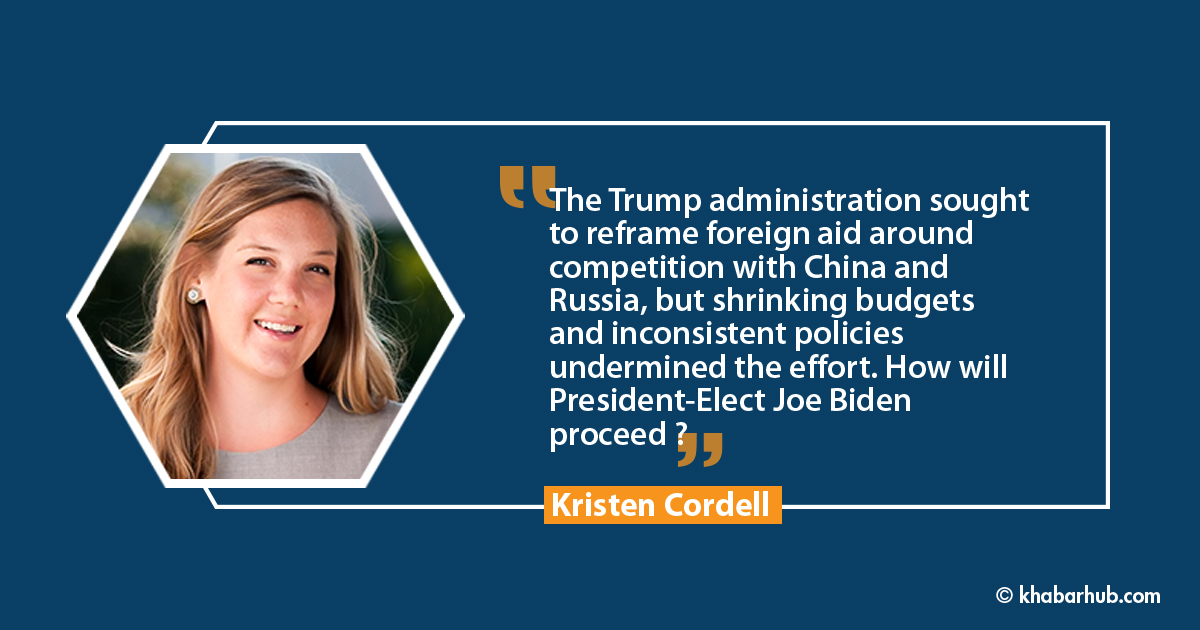0%

U.S. President-Elect Joe Biden’s transition teams include many experienced hands in the development field. But the world they are inheriting is significantly different from the one during their last go-around.
The past four years under President Donald J. Trump have seen a new framework for deploying foreign assistance, politicization of that assistance, and significant cuts to development budgets.
The immediate priorities of the incoming administration—including the development response to COVID-19—will have significant implications for how aid fits into Washington’s larger foreign policy agenda.
What was President Trump’s approach to development aid?
The Trump administration never had the wonky transition conversations that are happening today. The first direction to development agencies, including the U.S. Agency for International Development (USAID), came from Trump’s 2017 National Security Strategy (NSS), the first comprehensive statement of the administration’s thinking on foreign policy.
The NSS reframed foreign assistance as an essential part of winning the “great power competition” with China and Russia.
The framework offered a new way of thinking about the U.S. competitors’ activities in the developing world. Efforts such as China’s Belt and Road Initiative or Kremlin disinformation campaigns, it posited, have development implications, and therefore U.S. development tools must be part of any response.
The SDGs offer the United States an entry point into global engagement on education, health, and technology targets, as well as an opportunity to highlight the administration’s robust domestic agenda.
However, implementing this approach proved difficult. Before the ink was dry on the NSS, the National Security Council began a process to “realign” foreign assistance to better compete against adversaries.
Though the concept of a review was a good one, the principles themselves were contradictory, inherently political, and never made public.
The realignment was also accompanied by budget cuts and America Firs rhetoric that created confusion for U.S. development agencies responsible for carrying it out.
What is Biden’s view on development?
The Biden team recognizes assistance as a crucial foreign policy tool. Biden’s nominee for secretary of state, Antony Blinken, has called for aid to be “the center of our foreign policy.”
It is likely this will include putting development at the service of strategic competition and national security goals.
This will likely be more nuanced than Trump’s blunt great power framework, and focus on priority areas with the greatest opportunity to advance U.S. development approaches in opposition to those of adversaries.
Early indications are that it will include: strengthening health systems in response to COVID-19, including bringing back USAID’s pandemic forecasting program, rebuilding U.S. global health leadership, and supporting global supply chains to ensure vaccine distribution; bolstering democratic governance in response to rising authoritarianism, including efforts to curb local corruption and fight against the “infodemic” of misinformation; bridging the pandemic-exacerbated digital divide in health and education systems, in support of the 2020 USAID Digital Strategy and the Digital Development Principles; and, addressing significant challenges that COVID-19 has created for marginalized youth around the world, and recognizing the strategic imperative of pushing back against the encroaching interests of U.S. competitors in education.
What else should the Biden team be thinking about?
Much has been said about the incoming administration’s expected reset of multilateral alliances and mitigation of the damage caused by the U.S. retreat in international forums.
Equally important is the role these institutions play in setting development standards.
On matters such as internet connectivity and digital education standards, U.S. competitors have realized the value of their presence in multilateral bodies with influence over development systems.
Development tools are critical to advancing national security and foreign policy interests, not least because helping developing countries become more prosperous offers opportunities for new strategic alliances.
The new administration should respond by rebuilding links to United Nations Development Program (UNDP) leadership on the Sustainable Development Goals (SDGs), which the Trump administration largely overlooked.
The SDGs offer the United States an entry point into global engagement on education, health, and technology targets, as well as an opportunity to highlight the administration’s robust domestic agenda.
Biden’s teams at the United Nations, State Department, and USAID should work together to identify new development partnerships with lesser-known development bodies, such as the Organization for Economic Cooperation and Development (OECD), the International Telecommunication Union (ITU), and the United Nations Education, Scientific, and Cultural Organization (UNESCO).
Partnerships with these organizations could lead to shared programming on critical development issues across sectors, and in so doing restore multilateral alliances from the ground up.
Why does the development aid agenda matter?
Development tools are critical to advancing national security and foreign policy interests, not least because helping developing countries become more prosperous offers opportunities for new strategic alliances.
As the incoming administration thinks through its own policy processes, such as the NSS and the National Defense Strategy, it should ensure that development programming in the health, education, and governance sectors are directly responsive to such geopolitical priorities.
This means targeted programming objectives in areas that amplify the difference between what is on offer from the United States and from strategic competitors.
Doing so in a consistent, cohesive, and strategic way will ensure development sits at the heart of efforts to advance U.S. goals and interests.
(Kristen Cordell is a CFR international affairs fellow with the Project on Prosperity and Development at the Center for Strategic and International Studies (CSIS) in Washington, DC.)
Copyright: Creative Commons